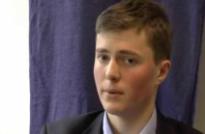Patrick

Patrick was diagnosed with X-linked Alport Syndrome at a very young age due to a family history of Alport Syndrome. Alport Syndrome has primarily affected his hearing so far, but Patrick expects to have a kidney transplantation as soon as his kidneys start declining. In general, Patrick feels that with social support Alport Syndrome doesn’t have to be a life changing condition.
Patrick is in his last year of college. His family are part of a national charity and support group for people with Alport Syndrome, and Patrick is active in awareness-raising and peer support. Ethnicity: White British.
More about me...
Patrick was diagnosed with X-linked Alport Syndrome at a very young age. Alport Syndrome runs in his mother’s side of his family and one of his younger brothers has it as well. As Alport Syndrome has always been part of Patrick’s life, routines such as taking medication or doctor visits feel totally normal for him.
So far, Alport Syndrome has mainly affected Patrick’s hearing. He started wearing a hearing aid at age 8. Patrick recalls how the hearing aid felt ‘incredibly liberating’ once he got used to them. He has recently switched from an NHS hearing aid to a private one, which is much smaller and less intrusive. Patrick doesn’t think that his hearing condition has much impact on his social life, and it has never stopped him from going out or playing sports. Generally, he finds that people are very helpful and supportive if they know he has a hearing aid.
Patrick hopes to have a kidney transplant before he has to go on dialysis. He used to sink into periods of depression from the prospect of such a major operation, but since the process and the prognosis of transplantation were explained to him, he feels less worried. He plans to travel for a year after he finishes his studies and visit all the countries he potentially will not be able to after transplantation.
Patrick and his family are active in a national charity and support group, Alport UK. He is also part of a youth network for people with kidney conditions. He finds it essential for newly diagnosed people to talk to others with Alport Syndrome because he feels that much of the available information is overwhelmingly negative. Patrick received most of his Alport-related knowledge from his mother, but he also found hospital units and some online forums very helpful.
Patrick’s message to people living with Alport Syndrome is that “it doesn’t have to be anything else other than an inconvenience”. He would advise them to try and develop a routine around their medication and hearing aids because that helps normalise the condition.
Patrick says that if he had children with Alport Syndrome he would give them support and normalise the condition.
Patrick says that if he had children with Alport Syndrome he would give them support and normalise the condition.
Patrick says his ‘carefree’ attitude to Alport Syndrome is the result of all the support he’s had.
Patrick says his ‘carefree’ attitude to Alport Syndrome is the result of all the support he’s had.
In summary I just think my approach my Alports is that it doesn’t have to be this thing which you're battling and you're trying to understand. With the right support network and the right information and the right outlook it's very easy to deal with. Teachers and colleagues and everything, they are really understanding if you give them the opportunity. Yeah it doesn’t have, Alports doesn’t have to ever be anything else other than an inconvenience I think.
Patrick’s education was suffering but once he got used to having hearing aids he found them ‘liberating’.
Patrick’s education was suffering but once he got used to having hearing aids he found them ‘liberating’.
Patrick describes what he did to prepare for a trip to Honduras and says he wants to visit many other places.
Patrick describes what he did to prepare for a trip to Honduras and says he wants to visit many other places.
OK and so was this like a family trip, was it - ?
No, no it was with my school, we were going with a scientific organisation called Operation Wallacea actually, actually studying these animals with actual scientists – it was great.
Wow
It was so cool.
Oh I'd really like to, South America I'd love to go to. Asia would be a priority I think just cos of course you can't there. Australia is fine but -. So, we went to Thailand last year and part of the motivation for going to Thailand for our family was, you know at some point we're not going to be able to go here so let's do it now and let's experience, experience it now. China would be fantastic. I'd love to go to Russia – that’s not, that’s not a thing I don’t think transplant would limit that but I'd like to go to Russia you know.
Patrick’s friends were fantastic about it when he started wearing hearing aids.
Patrick’s friends were fantastic about it when he started wearing hearing aids.
So, your friends reacted very positively?
My friends were really great actually, they were helpful and stuff like when you're in a group right, it's very, very hard as a person with hearing aids because you can't really focus on multiple people, you have to, you know be very aware of who's speaking; you have to look at them and you have to read their lips. My friends were absolutely ready to help me with that – you know stand in a circle so I could see everyone – that sort of thing, it was great.

